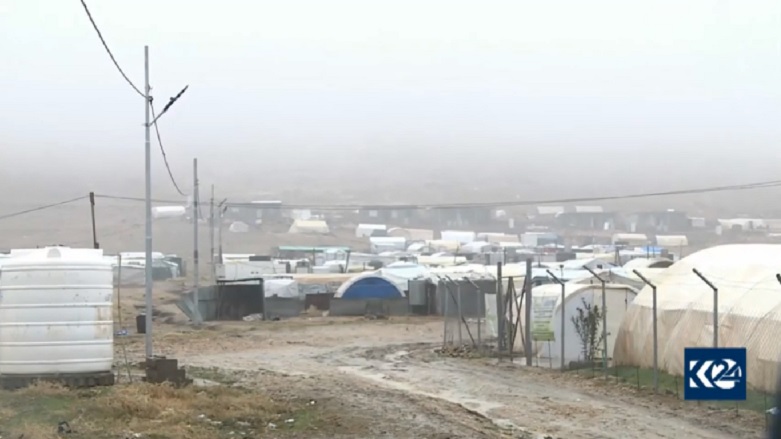ERBIL (Kurdistan 24) – Thousands of Yezidis (Ezidis) who live at the Sardasht displacement camp on Mount Sinjar have called for basic humanitarian aid as winter takes its toll on the residents there.
The Sardasht camp was constructed in 2014 with 2,300 tents. There are currently 14,300 Internally Displaced Persons (IDPs) and victims who survived at the hands of the Islamic that live at the camp.
Despite the camp having been constructed for six years now, IDPs there complain that tents are damaged and have never been replaced.
Ibrahim Khodida, an elderly man, displaced from Sinjar (Shingal), said there is also a shortage of water, basic services, and humanitarian assistance.
“I plead with the government, the humanitarian community, and the relative sides to come to our aid,” Khodida told Kurdistan 24. “We only request water, electricity, basic humanitarian aid, and a doctor.”
Murad Khame, another IDP at the camp, said residents have been without electricity for 15 days. “It’s been raining heavily with blinding fog for eight days now, and we don’t have any services,” Khame told Kurdistan 24.
“Most of the humanitarian organizations come here and offer nothing, but take advantage of the situation for their publicity.”
Ali Shabo, a representative of Iraq’s Ministry of Migration and Displacement (MoMD), said weather conditions had affected the living condition of people at camps, especially the elderly and children.
“We have children and elderly people who live at the camp. Rain and fog have become common here, which deteriorates the condition of tents quickly,” he stated, urging the relevant authorities to find radical solutions, not temporary ones. “A food basket is not the only solution.”
Shabo noted that the situation of displaced persons has not changed in five years and said humanitarian aid was not enough. He called on the Iraqi government “to solve the political struggle” in Shingal, so its residents can return.
Ezidis suffered heavily at the hands of the Islamic State following its emergence in Iraq in 2014. The occupation of the Ezidi-majority city of Shingal led to the displacement of hundreds of thousands of people.
Furthermore, Islamic State militants subjected women and girls to sexual slavery, kidnapped children, forced religious conversions, executed scores of men, and abused, sold, and trafficked women across areas they controlled in Iraq and Syria.

